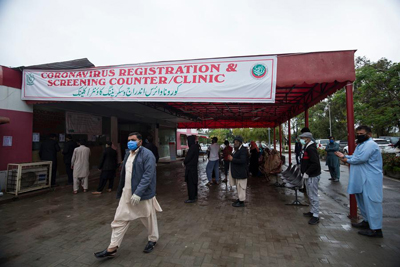Protecting young people from smoking
Smoking remains a significant public health challenge in Pakistan, particularly among young people. Despite widespread awareness of its harmful effects, tobacco use continues to rise among adolescents and young adults. Recent studies indicate that 17.2% of Pakistan's population smokes, with male smokers accounting for 28.4% and female smokers 6%. The age group most affected falls between 25 to 44 years, but smoking is increasingly penetrating adolescent demographics.
Several factors contribute to the increasing prevalence of smoking among young people in Pakistan. These include peer influence, easy accessibility, lack of awareness, and aggressive marketing strategies. Many adolescents start smoking due to social pressure or the influence of friends who smoke. Friends are the main cause of initiating smoking among young people. And friends are also the reason for relapsing into smoking after making a quit attempt. Cigarettes and other tobacco products are widely available, often sold near schools and colleges. Though the law on tobacco control prohibits selling cigarettes and other tobacco products near educational institutions, the implementation remains weak.
It is critical to stop young people from taking up smoking. If Pakistan can successfully help young people stay away from smoking, the journey to a smoke-free future will be smooth. For this, Pakistan needs to review the strategies implemented by countries like New Zealand and England to end smoking.
New Zealand has taken a groundbreaking step toward a smoke-free future by passing legislation that permanently bans the sale of cigarettes and tobacco products to anyone born after 2008. This means that as time progresses, fewer and fewer people will be legally allowed to purchase tobacco, effectively phasing out smoking for future generations. The law also includes measures to reduce nicotine levels in tobacco products, making them less addictive, and drastically cutting the number of retailers allowed to sell tobacco—from 6,000 to just 600 nationwide. Reducing the retailers selling cigarettes across Pakistan would be a significant step forward.
There is also a need to enforce stricter regulations on tobacco advertising, especially on digital platforms. It is also high time to launch nationwide awareness programs highlighting the dangers of smoking. Now that technology has provided numerous platforms for instant reach and contact, young people should be kept updated about the dangers of smoking constantly.
It would be a good step if the dangers of smoking and its effects on health are made part of the school curricula. Young people should be informed about the real-life stories of individuals affected by smoking-related diseases.
Pakistan needs to implement strict no-smoking policies in schools, universities, and public spaces. Simultaneously, families should be encouraged to maintain smoke-free homes to reduce exposure to secondhand smoke.
A missing link in Pakistan’s tobacco control efforts is the lack of smoking cessation programs. Every smoker, at some point in life, wants to quit smoking. At this occasion, a smoker should have knowledge and access to smoking cessation programs at the local levels. There is a need to establish accessible quit-smoking programs for young people, which should be backed by counselling and nicotine replacement therapies for those struggling to quit. In this regard, the role of healthcare providers is critical. They can help to support young people in quitting smoking.
A comprehensive approach to tobacco control requires interventions at multiple levels to effectively transform the system. The policy interventions include implementing tobacco taxation, restricting advertising and sponsorship, and enforcing regulations to deter smoking. The smoke-environments require establishing bans on smoking in public spaces like workplaces, and playgrounds while promoting plain packaging. Community can help strengthen local tobacco control initiatives. The support for smokers provides accessible quitting resources, including counseling and cessation programs, to help individuals transition away from tobacco use. The integration of the health system encourages healthcare providers to track and report smoking status, ensuring tobacco control remains a priority in medical settings.
The writer works for ending combustible smoking
اردو مضامین
ترک سگریٹ نوشی کی مخالفت کیوں؟، ارشد رضوی

پاکستان سن 2002 میں ورلڈ ہیلتھ آرگنائزیشن ( ڈبلیو ایچ او ) کے فریم ورک کنوینشن آن ٹوبیکو کنٹرول (FCTC) کا رکن بنا تھا، تب سے اب ( 2023 ) تک اکیس سال گزر چکے ہیں پاکستان (اور دنیا بھر) میں سگریٹ نوشوں میں اضافہ ہی ہوا ہے۔ ایک رائے کے مطابق دو کروڑ نوے لاکھ ( 29,000,000 ) جبکہ بعض رپورٹس تین کروڑ دس لاکھ ( 31,000,000 ) سگریٹ نوشوں کی موجودگی کی بات کرتی ہیں، اگر پچیس کروڑ کی آبادی مان لی جائے تو پاکستان میں 12 فیصد آبادی تمباکو استعمال کرتی ہے۔
ترک سگریٹ نوشی میں مدد گار متبادل، ارشد رضوی

سگریٹ یا تمباکو نوشی کے نقصان دہ اثرات کے بارے میں ستر سال قبل ہونے والی ایک سٹڈ ی میں بتایا گیا تھاتب سے اب تک دنیا میں کروڑوں لوگ تمباکو سے متعلق بیماریوں کے باعث موت کی تاریک وادی میں جا چکے ہیں
صحت، تمباکو اور ریونیو، ارشد رضوی

تمباکو نوشی کا انسان سے رشتہ بہت پرانا ہے۔ تمباکو اور اس سے متعلق مصنوعات کی طویل تاریخ ہے جو 6000سال قبل مسیح میں ملتی ہے۔مقامی امریکیوں کے بارے میں کہا جاتا ہے کہ انہوں نے پہلے تمباکو کی کاشت شروع کی اور یہ 6000سال قبل مسیح میں ہی ہوا۔
انسانی صحت اور عالمی ادارہ صحت، ارشد رضوی

اگر عالمی ادارہ صحت کچھ مختلف طرزِ عمل اختیار نہیں کرتا اور تمباکو پالیسی میں جدّت کو قبول نہیں کرتاتو ادارہ دل، کینسر اور پھیپھڑوں کے امراض میں کمی کے اہداف کے حصول میں بہت پیچھے رہ جائے گا۔
جو فرد سگریٹ نوشی ترک کرنا چاہتا ہے اس کی نیکوٹین کی طلب اور نفسیات کو سامنے رکھتے ہوئے کونسلنگ کی ضرورت ہے، ڈاکٹر احسن لطیف

اگر ہم چاہتے ہیں کہ سگریٹ نوشی ختم ہو جائے تو سگریٹ پینے والوں کواس بارے میں تمام بحث میں سب سے آگے ہونا چاہئے تاکہ وہ اپنی ضرورتوں کا خیال رکھ سکیں۔
ما قبل کورونا اور ما بعد، ارشد رضوی

کورونا کے مابعد اثرات میں ایک خوفناک ترین اثر بڑے پیمانے پر دنیا کی آبادی کے ایک بڑے حصے کا خطِ غربت سے نیچے گِرنے کا اندیشہ ہے جس کے نتیجے میں بے روزگاری اور غربت میں غیر معمولی اضافہ ہو گا۔
OUR PROJECTS
Pakistan is a country with heavy use of tobacco. With more than 24 million...
Read MoreRESEARCH ARTICLES
The Birth of Harm Reduction Informs the World's Need for Safer Nicotine...
Read MoreWHAT WE DO?
Alternative Research Initiative (ARI) works to provide researched-based solutions...
Read More
